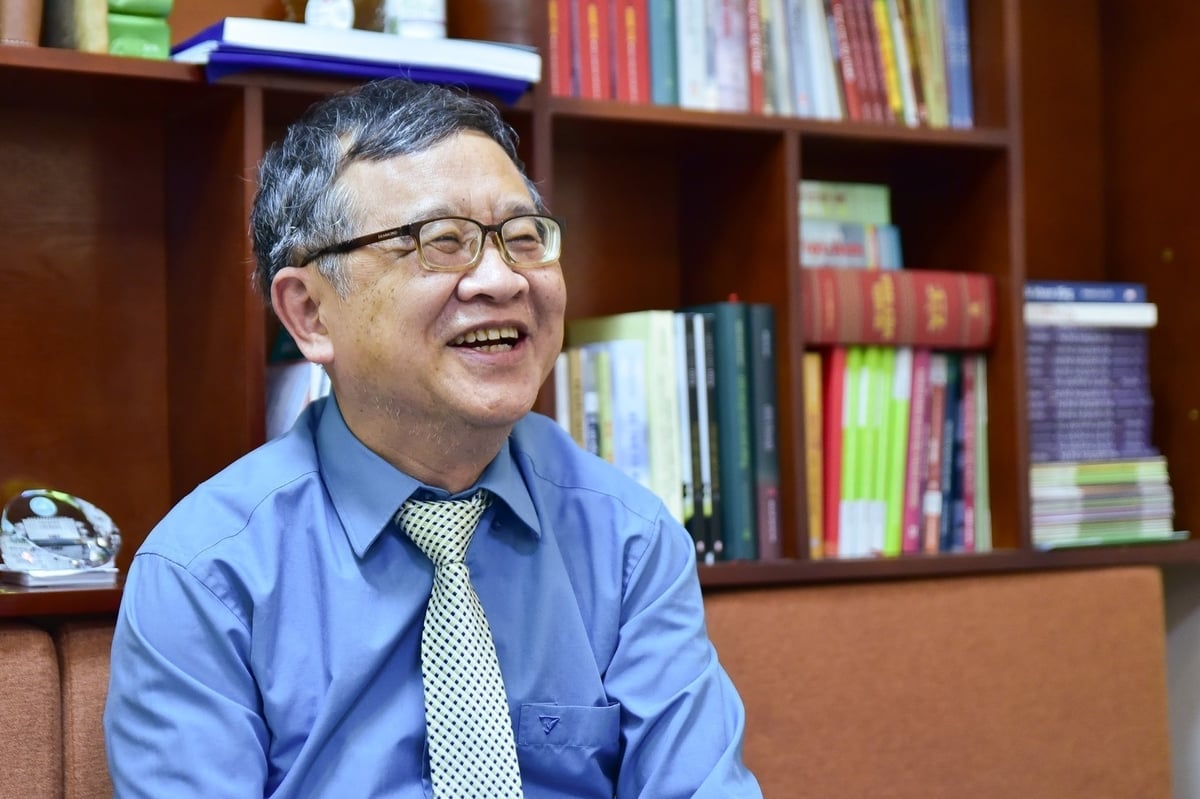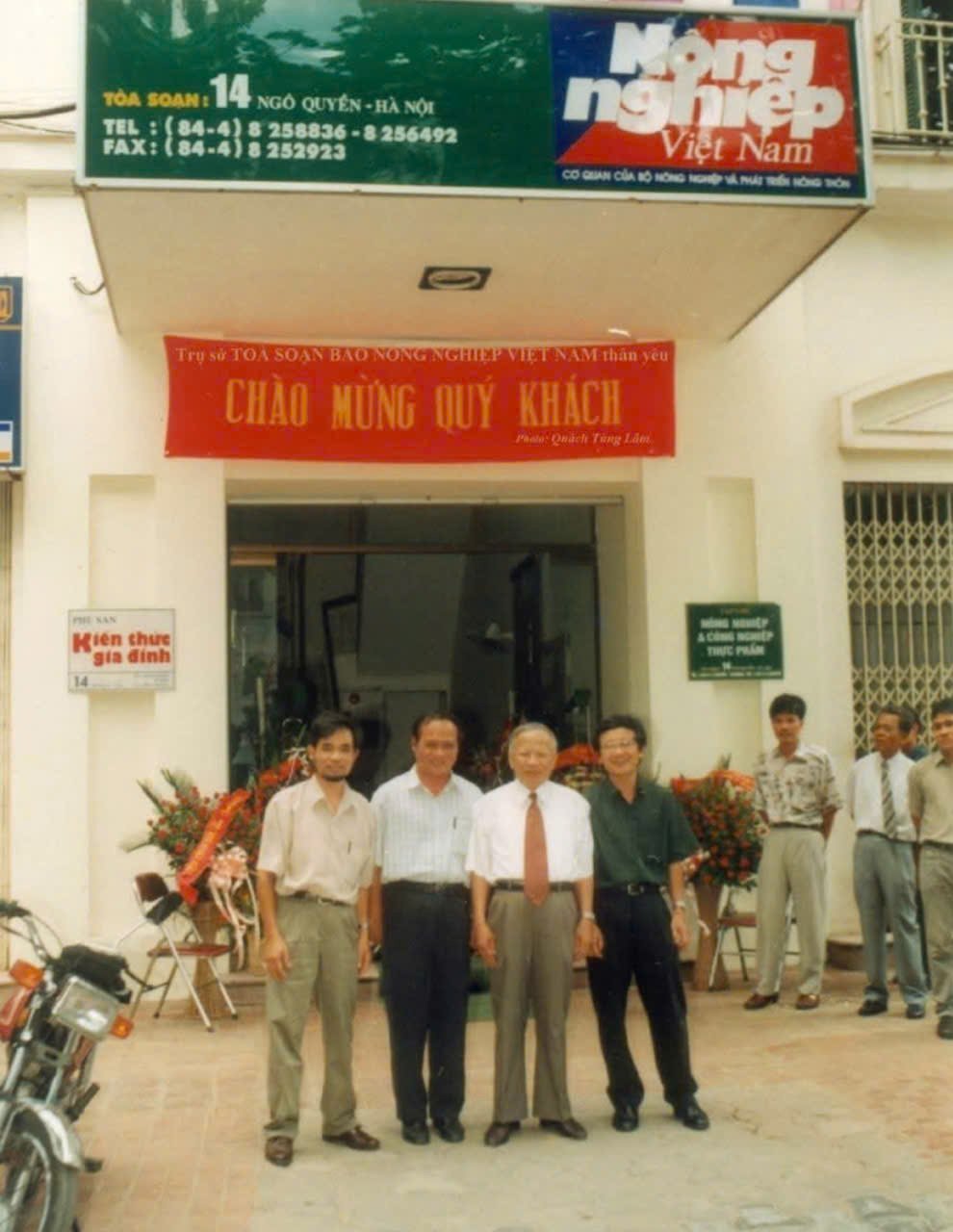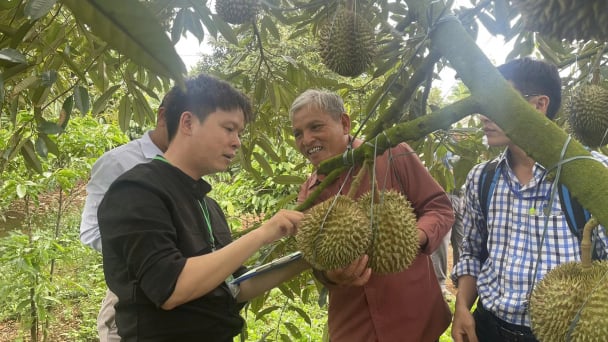May 31, 2025 | 15:21 GMT +7
May 31, 2025 | 15:21 GMT +7
Hotline: 0913.378.918
May 31, 2025 | 15:21 GMT +7
Hotline: 0913.378.918
Old stories about a time in journalism, in a context that resonates with the verse by Bang Viet: "Those days were so poor, yet so full of joy."
In 1987, the Ministry of Agriculture and Food Industry was established by merging the Ministry of Agriculture, the Ministry of Food, and the Ministry of Food Industry. Minister Nguyen Cong Tan signed the decision to establish the Vietnam Agriculture Newspaper - the official press agency of the agricultural field.
I worked for the Vietnam Agriculture Newspaper under the leadership of Minister Nguyen Ngoc Triu and the editors-in-chief, including Deputy Ministers Duong Hong Dat, Nguyen Dang, Tran Khai, and other distinguished figures who were both managers and renowned scientists, always ready to mentor the next generation, including myself.

Journalist Trinh Ba Ninh, former Deputy Editor-in-Chief of the Vietnam Agriculture Newspaper. Photo: Tung Dinh.
At the new office, my first impression was seeing so many people. Back then, the newspaper was published just once a week, with each issue containing only eight pages, yet nearly a hundred people were involved in producing it. The organization had a full range of departments: business department, Services department, Production division, Finance division, Culture and Society division, Editorial division, Reader Relations division, and the Magazine.
Even naming the newspaper was a back-and-forth debate. Some suggested taking one word from each of the merging ministries and calling it Food (Nong Luong). Others disagreed and pushed for names like Agri-Food (Nong Thuc pham) or at least Agricultural Products (Nong San). In the end, Minister Nguyen Cong Tan decided on Vietnam Agriculture Newspaper and personally wrote the introduction to readers.
There were many people, but little work, so what stands out most in my memory is the struggle to meet basic needs. The newspaper’s first issue came out as the entire country was abuzz with Doi Moi, but our team had little mental space to keep up with life. As our elders used to say: “You can’t follow the way of virtue on an empty stomach.” Feeding a hundred people in that context was no easy task.
At the time, our main source of income was from assembling rice ration booklets and official forms for the sector. (The Agri-Food Newspaper was the exclusive agency issuing rice ration books for citizens nationwide.) The volume was massive. The newspaper was distributed under strict government control. Editorial offices received limited allocations, not based on market demand. During those years, poet Huu Thinh once wrote:
"Now I understand how our country saves/Why we cut down paper for poems/To print sugar and meat ration coupons instead."
It took nearly five years for the Vietnam Agriculture Newspaper to reorganize its structure, streamline its staff, and fulfill the Ministry’s political missions, all while scraping together daily meals. It was exhausting and difficult. I remember in 1992, Editor-in-Chief Le Nam Son had to scramble to borrow money just to pay staff salaries. In such conditions, how could anyone be inspired to produce great journalism?
Looking back, we often joke that perhaps no other newspaper in the Vietnamese revolutionary press had to do as many things as the Vietnam Agriculture Newspaper. Beyond publishing daily papers, weeklies, and supplements, we also raised shrimp, cows, fish, cultivated cassava abroad, grew rubber and coffee, and even traded rice.
There was even an idea to form a fleet of offshore fishing boats. Thankfully, we didn’t find enough qualified captains, so it never launched. Otherwise, heaven forbid, had we failed to catch any fish and the boats sank, the newspaper might’ve gone down with them! We even established a service company and opened a bookstore, hoping to generate revenue like other newspapers. But, as with many things, not everything turned out as we had hoped.
To support ourselves, we did everything possible. There were successes and failures, but everyone was deeply committed. We did whatever was necessary: first, to put food on the table, and second, to ensure our pens weren’t weighed down by the burdens of survival.
As for true journalism, it wasn’t until after 1992, when a young, energetic new editor-in-chief arrived, that the newspaper began to find its direction. Of course, we still operated in a “building the plane while flying it” fashion, much like today, but at least the organization was structured, we had the right people in place, and we had the support of the Ministry’s leadership, especially encouragement from Minister Nguyen Cong Tan. The paper’s vitality quickly surged. Issues became more frequent, pages increased, and the content greatly improved. In particular, the Lunar New Year edition helped establish the Vietnam Agriculture Newspaper as a beloved brand among readers.
I remember during his ten years as Minister, Nguyen Cong Tan was especially supportive and attentive to the newspaper. His encouragement meant a great deal. Every time he met with us, he would joke: “Whatever you ask for, the Ministry will try to support, just don’t ask for money!” That was the spirit of the times, the whole country was struggling.
Once the newspaper firmly established itself as the official mouthpiece of the Ministry and a social forum for agricultural development and rural education, the momentum really picked up. We tackled hot, controversial issues both inside and outside the sector, and of course, that meant we couldn’t avoid clashing with certain individuals or organizations. Whenever “something happened,” Minister Nguyen Cong Tan would simply say:
"It’s your newspaper, and the responsibility is yours. I just ask that, whatever you write, you remember three things: The information must be accurate, the intention must be sincere, and the spirit must be constructive."

Journalist Trinh Ba Ninh (far right) with Mr. Nguyen Cong Tan, Mr. Le Nam Son, and journalist Thai Sinh during the early days of the launch of the Vietnam Agriculture Newspaper. Photo: Quach Tran Lam.
Particularly noteworthy were the pressing issues related to agriculture, farmers, and rural life that the newspaper investigated and reported on. After being published, these articles often caused quite a stir in society. Some standout investigative series included: “Anh Ba, anh Tuy oi. Cu the nay thi Nghe An con kho mai” (“Dear Mr. Ba and Mr. Tuy, If Things Continue Like This, Nghe An Will Suffer Forever”), “Just Over 20 Kilometers from Hanoi: A Region with No Government,” and “10 Kilometers from Hanoi: A Village Like Chi Dau’s…”
The newspaper also dared to tackle hot-button issues and negative aspects within the agricultural sector itself, ones that implicated even senior officials. These were not easy stories. And yet, Minister Nguyen Cong Tan and other ministry leaders always paid attention and lent their support, consistently upholding the principle: The mission of journalism is to confront what is wrong, and to protect, encourage, and spread what is right.
I’ve always believed that this was one of the Vietnam Agriculture Newspaper’s greatest fortunes, something few other media outlets enjoyed. Generations of Ministry leadership didn’t just care for the newspaper; they also “raised the ceiling,” allowing it to realize its full potential, utilize its strengths, and be protected and empowered in doing so. Thanks to this support, the paper was able to dig deep into many critical issues in agriculture and rural life, producing impactful series like “Worries of the Countryside,” “What Budget Can Bear the Load?” “The Burden of Poor Villages,” and “Tears of the Lo River…”
On the flip side, generations of Vietnam Agriculture Newspaper journalists have always recognized the need to live up to that trust and affection with passion, responsibility, persistence, and resilience. Our reporters could get by on just rice and roasted peanuts, yet still pedal hundreds of kilometers to report on the Ministry’s policies and outreach efforts. Some would spend entire months traveling to relentlessly confront shortcomings in real life, all under the unwavering guiding principle: Accurate information, pure intentions, and a constructive spirit.
That spirit gradually became a style even a unique culture of its own. Many of the “subjects of our reporting” eventually became friends of the Vietnam Agriculture Newspaper, because they recognized that what the paper published was true, objective, and constructive.
The late journalist Huu Tho often said: “In journalism, never play funeral music at a wedding. Instead, play the trumpet of a charge.” Sometimes, the work of journalism isn’t about absolute right or wrong. What matters is achieving a truly humanistic and objective perspective. That requires knowledge, experience, and above all, heart.
In this new era, I believe the Vietnam Agriculture and Nature Newspaper holds even greater opportunities. Professionally speaking, the paper’s scope is now broader, its space more open, and readers’ expectations higher than ever. More importantly, the contributions of the agriculture and environment sectors to society continue to grow immensely.

Vietnam Agriculture and Nature Newspaper (VAN News) must undoubtedly become a solutions-oriented publication. With the knowledge and lived experience of each journalist, combined with contributions from experts, scientists, and readers both at home and abroad, the newspaper will surely become a trusted channel — one that delivers the most accurate, objective, and scientific information in its field. In other words, the value of knowledge must and will take center stage at the VAN News.
What truly matters, in my view, are still the three core principles that built the legacy of the former Vietnam Agriculture Newspaper: Accurate documentation, sincere motivation, and a constructive spirit. Each journalist of the Vietnam Agriculture and Nature Newspaper will remain a “secretary of the times” filled with passion, dedication, and a sense of responsibility toward their craft, continuing the proud tradition passed down from generations of the Vietnam Agriculture Newspaper and the Environment and Natural Resources Newspaper.
Looking back on nearly half a century of the Vietnam Agriculture Newspaper, many events, though seemingly fragmented, take on new shades of meaning when viewed through the lens of today. Yet, one thing I hold to be true: Beyond daily struggles for livelihood, there was always a deep passion for journalism and a profound sense of social responsibility. And above that, a burning desire to contribute.
And I believe in you.
Translated by Kieu Chi

(VAN) For the durian industry to succeed, the value chain must fulfill its commitments to the government, the community, and international partners.

(VAN) Vaccinating juvenile pangasius helps reduce disease, antibiotic use, and farming costs, increasing profits for export-oriented farmers in An Giang.

(VAN) Due to a limited supply of workforce and competitive recruitment requirements, businesses struggle to retain talented veterinary human resources.

(VAN) WOAH’s guidance aims to mitigate disease risks through a One Health approach that balances economic, conservation, and public health interests.

(VAN) Ms. Nguyen Thi Dung, Deputy Director of Ngoc Hoang Cooperative, shared about the journey of bringing dragon fruit to Europe, achieving annual revenues in the billions of VND.

(VAN) Bamboo products from Thang Tho Bamboo Cooperative have reached many countries around the world, while also creating jobs for local workers.

(VAN) The Management Board of Con Dao National Park reported that a green sea turtle, tagged in the Philippines, has traveled thousands of kilometers to lay 84 eggs on Bay Canh Islet.